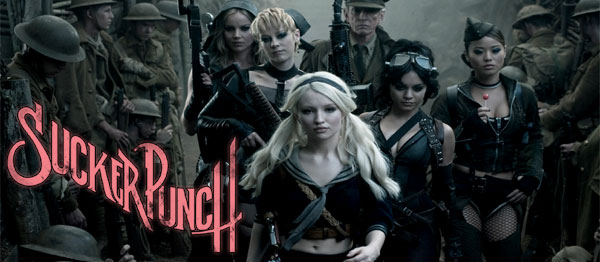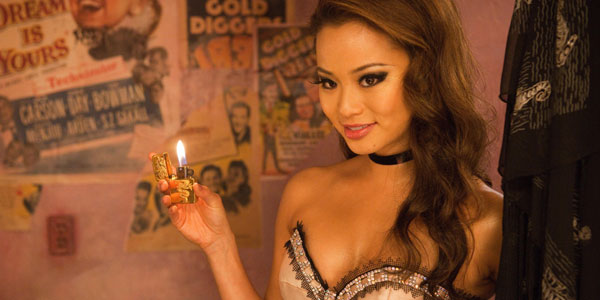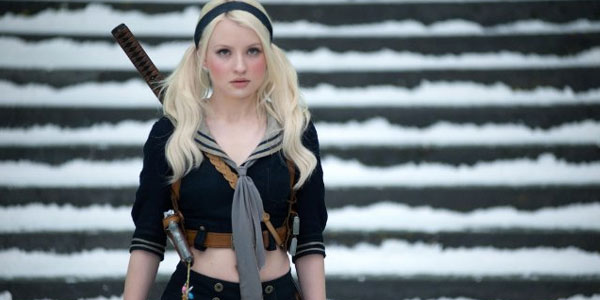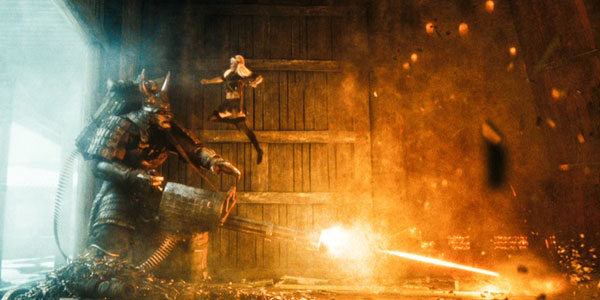
Steve Shibuya is probably very excited now that Sucker Punch, the movie he co-wrote with director Zack Snyder, is finally hitting theaters this weekend. It’s been a project that took 10 years to imagine, mold and write with his former classmate who, in the meantime, went on to direct films like Dawn of the Dead, 300 and Watchmen. But Shibuya, who marks his first major theatrical release with the action-packed film, is happy that this project took its time. Otherwise, he says, “10 years ago, [Snyder] could not have made this film. He gets better and better, and he had to do all those other films to…get a studio to read the script…They trusted Zack and told us to go for it.”
Warning, there are some spoilers ahead!
I had the opportunity to sit down with Steve Shibuya for a roundtable interview about Sucker Punch, where he shared the origins of the story and how the script came together. It’s not every day when someone is given the chance to work closely with a director like Zack Snyder, whose repertoire for action-packed sequences and dramatic special effects always lead to an entertaining film.
How did you come up with Sucker Punch? Did you and Zack develop the story together?
No, Zack had this idea for a while. He had this idea of a girl who could go into these worlds with no limitations on the action. He wanted to create a action movie that was unparalleled, where we could basically do anything we wanted to do. He had a couple of these big ideas that were just so strange and kind of wonderful, if we could make it work. And he had the title, too. Sucker Punch. And still the title doesn’t really…I think it was more of a feeling and by the time we finished writing the script, it made sense for the film.
That’s kind of how it started. He came to me to see if I wanted to collaborate on it.
Can you describe the writing process with Zack and how you put the script together?
It was just full imagination and creativity. It really was whoever had the stronger idea, we went with it. There was no ego or anything like that. We just wanted to make the strongest film possible, a film that we really wanted to see. The process was amazing: our writing styles really blended well, because we’re both very visual. Our scripts were very visual and descriptive and we would take turns. Like, “You write this section and I’ll write this.” Then we’d slam them together. And they really kind of melded easily together, and we would just work on each other’s page on whatever we wanted to change. That was the process.
It took 10 years because Zack’s film career began right when we started writing this. We started writing this thing and then he got Dawn of the Dead, and it was like, “Oh crap.” I said, “Okay, you go do that.” So he goes off [but] I was constantly pushing to keep this thing going.
 When you were working with Zack, were you in the same room or separately?
When you were working with Zack, were you in the same room or separately?
We were always working on ideas. The screenplay was a different time. The time up to [writing] the screenplay and we’d be working out this whole world, we would go away from each other, work on our own stuff, get ideas, write them down and then get together. We’d start hashing it out again. It took a while before we had a grasp on where we were going with it, and how it was going to work. But once we figured that out, everything started to fall together. It was a constant process of ideas and working together.
You come from an art background. When were you writing the screenplay and going through the action sequences, they were probably very detailed, yes?
Yeah, they were. We both have a very visual background and we really enjoyed getting into those worlds and creating.
When you have a world that has no limits, is that a challenge to your creativity?
The challenge was creating a story that would make those worlds believable. The challenge was getting there. How do you get to that place? I don’t think creating that was as difficult as figuring out just how do we get [Baby Doll] there.
In the movie, we open with the reality, go into the fantasy world and then return to the asylum. In the writing process, was there ever a time you discussed changing the structure of the film?
No, it was always that way because we wanted to be kind of like a puzzle. You go into this institution and then suddenly, you’re in a crazy brothel place. But everything in there is a reflection of the institution. In the institution, these girls were having therapy sessions with Mme Gorski where they work out their issues to heal themselves, maybe by doing a dance on stage. Everything in the brothel was happening in the institution at the same time, in some degree. It’s [Baby Doll’s] take on this world that she creates in her head. We wanted to create this puzzle that in the end, you can look back and try to see like, “Okay, that’s what was going on there.”
In the 50’s, they were still giving lobotomies to people. It was a terrible process and I remember reading stories about decrepit institutions where some orderly would take advantage of the patients, and also bring people in, too. That was the idea we started playing with. Zack already had this idea of a girl going into an institution but what if it was that kind of institution? And her escape from that? Now that sounds like a crazy idea for a film. And then you throw in all the other stuff on top of it.
 Can you explain the influence of Japanese culture on the film?
Can you explain the influence of Japanese culture on the film?
You know, the Japanese influence like reading manga and anime…That was never a conscious effort when we were writing it. I think that came in when we developed it with the artists but you know, Zack always saw Baby Doll looking like that, with the blond hair and the school girl outfit. But as far majorly the film being influenced by anime, that was never a reason for us writing this thing.
As far as the Japanese influence on this film, a lot of that comes from Zack. When I met him in school, he approached me and asked if I wanted to be in his film. He was a few years ahead of me and he wanted me to play this samurai. This was this short film about a samurai who basically has an image of this girl who’s laying in this creek and her blood is flowing from her head. He wakes up from this dream, walks into the forest and comes upon this same woman washing her clothes in the river. He starts to walk towards her and see these other two samurai coming, who he thinks are going to kill her. So he draws his sword and takes down these guys. At that moment, the girl is falling back from him, trips on a rock and she hits her head. He turns to see the same image that he dreamed of.
What’s interesting is that Zack was already playing with these ideas of dreams, and he has a deep connection with the Japanese culture. He has this painting in this house of this samurai with wild eyes, running through the forest with a sword. He’s got this deep connection with the culture and I think a lot of that is reflected in the film. He brought a lot of that with him.
Why did you choose to have the alternate reality be in a brothel?
That was Zack’s idea but really, on the outside, [Sucker Punch] looks like this crazy action movie but the way we really approached it was, it plays like a huge metaphor. For anybody that has suffered a tragedy or pain from childhood that they carry with them, those things shape who you are, your fears and issues like that.
I feel that a lot of times, as for me, I came to a point in my life where I had to figure out who I am, but I had to go back and figure out what I just went through. I had to figure out from my parents. When you make the choice to go inside and look at yourself and really be honest with the things that frightened you, you’re going in and fighting your demons. And when you successfully face them, they disappear. That’s when you are set free.
That’s the arc of this story: it’s a girl who basically suffers this incredible incident and she carries this emotional scar and feels responsible for what she did. The whole journey is her redemption, and at the end, she is able to redeem herself by setting someone free. I think at the same time, she saves her own soul. That’s the way I’ve always looked at this story. All the stuff on top of it, the brothel, all the worlds, those are just…that’s what’s inside of her that she has to face.
 Were there specific films that inspired you?
Were there specific films that inspired you?
No. What we wanted to create was a movie that was a full out action movie but almost an emotional journey at the same time. There are not a lot of films like that, like The Matrix, and I’ve sat through so many movies where you want to get behind the character but you can’t. I never understood why they don’t do that. We wanted to create something that you were invested it but with balls-out crazy action. That was our intention in writing this thing.
What’s the tie-in to the title?
He had that title. I don’t know why. I think he just liked it. I bet if you asked him that, that’s what he’ll say. In the end, it made sense. After we got done writing it, I thought it was perfect because that’s how people are going to feel.
For more on Sucker Punch, check out our interview with cinematographer Larry Fong or enter our Sucker Punch Journey giveaway! The film opens in theaters on Friday, March 25th.








